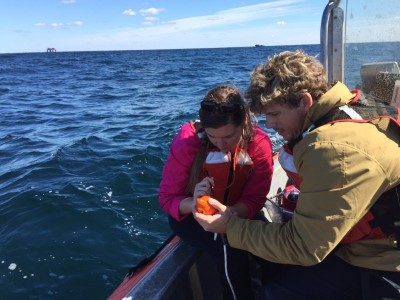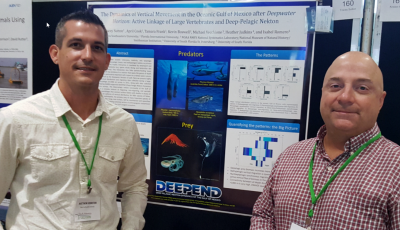NSU Newsroom
SharkBytes
Horizons
This version of NSU News has been archived as of February 28, 2019. To search through archived articles, visit nova.edu/search. To access the new version of NSU News, visit news.nova.edu.
This version of SharkBytes has been archived as of February 28, 2019. To search through archived articles, visit nova.edu/search. To access the new version of SharkBytes, visit sharkbytes.nova.edu.
Representatives from Halmos College of Natural Sciences and Oceanography Present at Gulf of Mexico Oil Spill and Ecosystem Science Conference

Kathryn Howe and John Kluge, graduate students at the Halmos College of Natural Sciences and Oceanography, participated in a two-week research cruise in the Gulf of Mexico aboard the R/V Walton Smith. Howe and Kluge were accompanied by Alexander Soloviev, Ph.D., professor at the college, and doctoral student Cayla Dean.
Faculty, students, and postdoctoral researchers from the Halmos College of Natural Sciences and Oceanography attended and presented research at the 2016 Gulf of Mexico Oil Spill & Ecosystem Science Conference, held February 1–4, 2016, in Tampa, Florida.
Almost 1,000 scientists, researchers, and environmental experts worldwide attended the conference to share the latest oil spill and ecosystem scientific discoveries, technologies and policies. The conference theme, “One Gulf: Healthy Ecosystems, Healthy Communities,” focused on opportunities to promote and sustain a healthy Gulf environment and economy, with an emphasis on the human dimensions of the oil spill in addition to ecosystem science research.
Tracey T. Sutton, Ph.D., associate professor at the college, is director and principal investigator of the DEEPEND (Deep Pelagic Nekton Dynamics) Consortium within the Gulf of Mexico Research Initiative (GoMRI). Seven NSU scientists from the DEEPEND Consortium attended the conference, including Sutton, Jose Lopez, Ph.D., professor; Tamara Frank, Ph.D., associate professor; Matthew Johnston, Ph.D., research scientist; Cole Easson, Ph.D., postdoctoral researcher; Andrea Bernard, Ph.D., postdoctoral researcher; Rosanna Milligan, Ph.D., postdoctoral researcher; April Cook, M.S., DEEPEND project manager, as well as three of Sutton’s former and current graduate students, Lacey Malarky, M.S., Nina Pruzinsky, and Michael Novotny. Cook, Frank, Easson, Lopez, and Sutton presented work on the ecology of organisms living in the deep Gulf interior, and how these organisms may have been affected by the Deepwater Horizon oil spill. This work, currently ongoing, is an extension of work initiated shortly after the oil spill in 2010 at the request of the National Oceanic and Atmospheric Administration (NOAA).

Matthew Johnston, Ph.D., (shown at left) research scientist at the Halmos College of Natural Sciences and Oceanography, and Tracey T. Sutton, Ph.D., associate professor at the college, were among the college faculty attending the Gulf of Mexico Oil Spill and Ecosystem Science Conference in Tampa, Florida.
Alexander V. Soloviev, Ph.D., professor at the college and a co-principal investigator in the CARTHE/GoMRI Research Consortium, and doctoral student Cayla Dean presented the results of laboratory experiments and numerical simulations on the dynamics of oil emulsions and plankton behavior. In addition to the conference, Soloviev and Dean attended a two-week research cruise in the Gulf of Mexico on the R/V Walton Smith. They were accompanied by graduate students Kathryn Howe and John Kluge. During the research cruise, the college team collected sea surface microlayer samples during TerraSAR-X and RADARSAT-2 satellite overpasses as part of the LASER/CARTHE experiment.
- Abigail Renegar, Ph.D., research scientist at the college, is co-principal investigator of the Clean Caribbean and Americas CoralTox project with Richard Dodge, Ph.D., dean of the college, and Bernhard Riegl, Ph.D., professor at the college. Renegar presented work with graduate student Nicholas Turner on hydrocarbon toxicity in shallow water corals, providing much needed data on coral resilience to hydrocarbon exposure. Renegar, who also is co-principal investigator of the GoMRI project DeTOX with Bernhard Riegl and Tamara Frank, presented upcoming research aimed at understanding oil toxicity in several ecologically important deep-sea zooplankton/micronekton.
Conference presentations by college members included:
- “Numerical Simulation of Diel Vertical Migrations of Zooplankton in Oil Emulsions and Freshwater Lenses” by Cayla W. Dean, Alexander V. Soloviev, Tamara Frank
- “A Gulf of Mexico Comparative Analysis of Cruise-Based Observations, Historical Data, and Numerical Model Results” by Sergio deRada, Brad Penta, Tracey Sutton, Matt Johnston, April Cook, Kevin Boswell, Chad Lembke, and David English
- “Spatial Dynamics of Microbial Communities Across the Northwestern Gulf of Mexico” by Cole Easson, and Joe Lopez
- “DeTOX: Deep Sea Ecotoxicology. Deep-Sea Risk Assessment and Species Sensitivity to WAF, CEWAF, and Dispersant” by Anthony H. Knap, D. Abigail Renegar, Tamara Frank, Bernhard M. Riegl
- “Vertical Distribution Patterns of the Cephalopod Fauna of the Gulf of Mexico” by Heather Judkins, Mike Vecchione, and April Cook
- “Quantifying Hydrocarbon Toxicity to Shallow-water Corals: Phenanthrene” by D. Abigail Renegar, Nicholas R. Turner, Bernhard M. Riegl, Richard E. Dodge, Anthony Knap, Paul Schuler
- “A TimeSeries Assessment of Polycyclic Aromatic Hydrocarbons in Fish Communities before and after the DWH Event” by Isabel Romero, Will Patterson, Tracey Sutton, Esther Quintana-Rizzo, Steve Ross, Andrew Kane, Steve Murawski, E.A Goddard, Jose Torres, and Dave Hollander
- “Surface Dynamics of Fresh and Weathered Oil in the Presence of Dispersants: Laboratory Experiment and Numerical Simulation” by Alexander V. Soloviev, Brian. K. Haus, Michael G. McGauley, Cayla W. Dean, David Ortiz-Suslow, Nathan Laxague, Tamay M. Özgökmen
- “The Dynamics of Vertical Movement in the Oceanic Gulf of Mexico after Deepwater Horizon: Active Linkage of Large Vertebrates and Deep-Pelagic Nekton” by Tracey Sutton, April Cook, Tamara Frank, Kevin Boswell, Mike Vecchione, Heather Judkins, and Isabel Romero
- “Quantifying Hydrocarbon Toxicity to Shallow-water Corals: 1-Methylnapthlene” by Nicholas R. Turner, D. Abigail Renegar, Bernhard M. Riegl, Richard E. Dodge, Anthony Knap, Paul Schuler